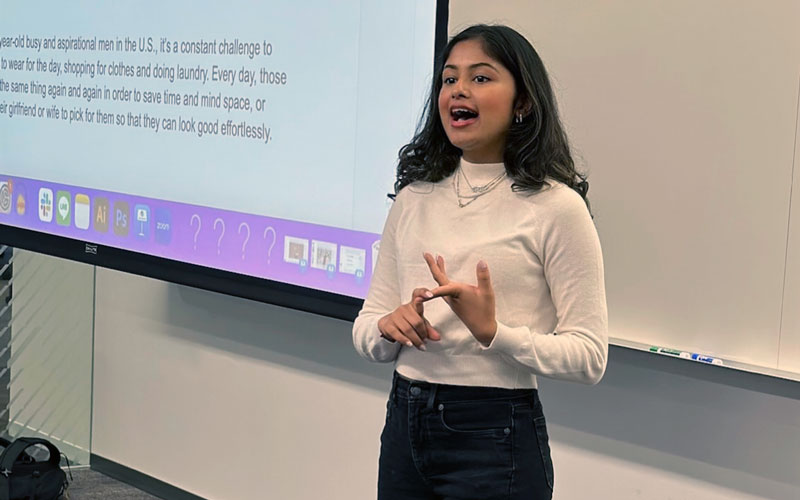Service, Scrappiness, and Storytelling
Shreya Pugalia’s (’23) curiosity, creativity, and service mindset led her from launching a sustainability startup in high school to an entrepreneurship minor and a career in finance.

For Shreya Pugalia (’23), entrepreneurship has never been just about launching a company: it’s a mindset rooted in curiosity, empathy, and making the most of every opportunity.
In this Q&A, Pugalia shares how her early interest in innovation evolved through Farley Center for Entrepreneurship and Innovation classes, how storytelling and scrappiness shaped her work, and why embracing storytelling is key to getting buy-in for your ideas.
Q: Did you know you wanted to study entrepreneurship when you got to Northwestern?
In my “Why Northwestern” essay, I wrote about the Farley Center because I was drawn to spaces where I could bring ideas to life. Entrepreneurship has always been important to me: I started a business in high school and pitched it to angel investors at the Massachusetts Institute of Technology.
At Northwestern, I went on to work with several startups, including a Kellogg School of Management venture focused on financial literacy and a consumer tech company offering Indian rental clothing. Those experiences deepened my interest in entrepreneurship, and when I saw Farley’s course catalog with classes in marketing, storytelling, and innovation, I knew I wanted to make it a formal part of my education.
Q: What was the startup you founded in high school?
It was called Earth Wind Box. Basically, it was built on a subscription model. We partnered with companies that made environmentally conscious and less-wasteful products that would replace things people use in their home and lifestyle. One example: instead of red plastic cups for parties, we partnered with a brand that made cups out of corn.
It wasn’t just about getting the word out about these startups doing cool things, but also connecting consumers with products they already know they need, just in a more environmentally mindful way. I’m very lucky I had that experience in high school because it really kicked off this passion for entrepreneurship.
Q: Who were some of the Farley professors or classes that left a strong impression?
I really loved Farley’s ENTREP 395: Storytelling for Business class. The instructor, Jen Baker, talked about how she had a long career working not just in stand-up comedy but also with organizations teaching communication, feedback, and self-advocacy.
As someone now working in the corporate world, and especially as a woman, those have been really important lessons: how to negotiate, how to take and give feedback, and how to manage up. I really got a lot of those lessons from her.
Q: What do you do now, and how do entrepreneurship lessons show up in your work?
I worked as an investment banking analyst for the last two years and will now be joining a tech private equity fund as an investment associate.
One thing I’ve applied from Farley is how to be scrappy and get your hands dirty. And especially in the age of AI, be open to learning new technology. Farley instructor Leonard Lee said something that really stuck with me. He said, “The people who will be successful are the ones who embrace new technologies.” That advice had a huge impact on me.
Q: What does having an entrepreneurial mindset mean to you?
For me, it’s a combination of things. I’ve always been interested in public speaking. I was involved with Toastmasters in high school, Model UN, and the Northwestern public speaking club.
I think having an entrepreneurial mindset means having a service mindset and understanding with empathy what you’re trying to solve, and being scrappy and making the best of the tools you have. When I was creating financial literacy lessons for survivors of domestic violence, I really had to use the limited tools and time I had to create something useful. That’s what entrepreneurship is.
Q: What advice would you give to current or prospective Farley students?
Get excited about things. If there’s something you have an interest in, take a class, talk to someone who works in that space, or even a friend who’s excited about it. For me, it all started with small sparks of interest that led to bigger things.
I definitely didn’t think I was going to be working in finance. But having conversations with classmates in finance and people in private equity led me down this path. Now I really love it. And even though I know there are other things I want to do in the future, it all just starts with chasing those small sparks.
Q: What is the biggest lesson you took away from Farley?
I think one of the biggest things I took away from entrepreneurship education that was different from economics or data science is learning how to build a narrative. In the corporate world, anything you do revolves around storytelling—whether that’s selling a product, pitching an idea, or getting people excited about something.
I’m really grateful for learning how to build that narrative and story arc in how I communicate. That makes all the difference in how people feel conviction about your ideas, and how you feel conviction about your own ideas.
